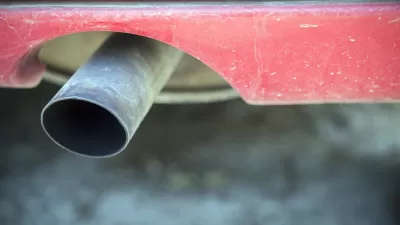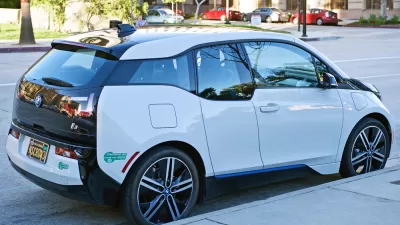A report from the Global Climate Action Summit on a looming deadline set by the Paris climate agreement: ending sales of new gas and diesel-powered light-duty vehicles by 2035.

"Transportation is the most vexing problem the summit will confront," reported Evan Halper for the Los Angeles Times on Sept. 11, the day before the 3-day Global Climate Action Summit began in San Francisco. Reducing emissions from driving is more complex than reducing emissions from electricity generation, as one energy expert cited in the article observed.
The political leaders coming from around the world for Gov. Jerry Brown’s climate action summit this week will grapple with a lot of urgent deadlines to drive down emissions, but one date is especially exasperating. It is 2035 — the year advocates aim to kill off production of gasoline- and diesel-powered vehicles.
Internal combustion engine cars need to be off the roads altogether by 2050 to meet the Paris goals. Dealers would need to stop selling new models 15 years earlier.
That will be a heavy lift, according to Peter Tertzakian, executive director of the Arc Energy Research Institute, a Canadian group that analyzes energy investments.
The idea that the internal-combustion engine can be phased out in the next 20 years without government intervention on a massive scale and an unprecedented social awakening among the driving public is foolish, said Tertzakian.
He said most leaders assume the average driver will embrace electric as technology improves, much as parts of the power industry gave up fossil fuels as better systems emerged. But giving up gas-powered cars requires complex shifts in the way people live that don’t come into play when a coal power plant is replaced with a solar or gas plant.
“The Paris agreement was signed three years ago,” Tertzakian said. “The years keep passing, and the substitution [of gas-powered vehicles] is not happening. Look at oil and gas use. It is not decelerating. It is accelerating.”
A new academic study and an updated survey on achieving phase-outs or bans on the sales of new internal combustion engine passenger vehicles by a date certain were released at the conference:
- 100% Zero: Solutions to Achieve Universal Zero-Emission Vehicle Adoption, by Ethan Elkind, Director of the Climate Program, Center for Law, Energy & the Environment at UC Berkeley Law, and Ted Lamm, Research Fellow in the Climate Program.
- A Survey on Global Activity to Phase Out Internal Combustion Engine Vehicles [pdf], by Isabella Burch, Center for Climate Protection, Santa Rosa, Calif.
Halper illustrates the aforementioned point made by Tertzakian of Arc Energy Research Institute, that "massive government intervention" is a requirement to achieve a phase-out:
The shift toward electric vehicles in parts of Europe and Asia is bolstered by government subsidies and tax structures that few American politicians would consider. They include tough gas-guzzler penalties for those who drive high-horsepower, climate-unfriendly pickups and SUVs, and large cash grants and tax breaks for those who buy electric.
One example of such a policy, not by a nation but by cities, was cited by Yunshi Wang, director of the China Center for Energy and Transportation of the UC Davis Institute of Transportation Studies during a panel discussion, "Gasoline/Diesel Car Phaseouts: New Global Strategy To End Petroleum Use" organized by Coltura and the Sierra Club.
Chinese cities limit the number of cars by restricting access to license plates, unlike most Western countries. Beijing reduced the quota for licenses of cars with internal combustion engines by a third in 2015, resulting "in around 2,000 applicants for every new car that uses diesel or petrol," reported Echo Huang on June 11 for Quartz. A lottery system selects the winners.
By contrast, EV licenses are available on a first come – first served basis, and applications have surged.
Nearly 290,000 applicants (link in Chinese) in Beijing are waiting to get a car plate for “new energy vehicles,” which in China includes EVs and plug-in hybrids, according to data the Beijing Municipal Commission of Transport put out on Saturday (June 9). But the city only has a quota of 54,000 (link in Chinese) for this year. Some might have to wait five years to get a plate, according to local news outlet Beijing Youth Daily.
However, Chinese vehicle buyers still want to purchase gas-guzzling SUVs, notes an earlier article in Phys.org, which emphasizes the need for regulations and market incentives to shift demand.
Additional posts on the historic summit:
-
A three-day global summit on climate action in San Francisco, hosted by Gov. Jerry Brown, is unlike other international climate summits in that it features "non-state actors," such as governors, mayors, and businesses, rather than nations.
-
Keep it in the Ground – 2018, Sept. 10As climate hawks gather in San Francisco for the Global Climate Action Summit that convenes Wednesday, Gov. Jerry Brown, host of the summit, is dogged by critics who can't distinguish between oil production and consumption.
FULL STORY: At Jerry Brown's climate summit, one deadline will overshadow all the others

Alabama: Trump Terminates Settlements for Black Communities Harmed By Raw Sewage
Trump deemed the landmark civil rights agreement “illegal DEI and environmental justice policy.”

Study: Maui’s Plan to Convert Vacation Rentals to Long-Term Housing Could Cause Nearly $1 Billion Economic Loss
The plan would reduce visitor accommodation by 25% resulting in 1,900 jobs lost.

Why Should We Subsidize Public Transportation?
Many public transit agencies face financial stress due to rising costs, declining fare revenue, and declining subsidies. Transit advocates must provide a strong business case for increasing public transit funding.

Wind Energy on the Rise Despite Federal Policy Reversal
The Trump administration is revoking federal support for renewable energy, but demand for new projects continues unabated.

Passengers Flock to Caltrain After Electrification
The new electric trains are running faster and more reliably, leading to strong ridership growth on the Bay Area rail system.

Texas Churches Rally Behind ‘Yes in God’s Back Yard’ Legislation
Religious leaders want the state to reduce zoning regulations to streamline leasing church-owned land to housing developers.
Urban Design for Planners 1: Software Tools
This six-course series explores essential urban design concepts using open source software and equips planners with the tools they need to participate fully in the urban design process.
Planning for Universal Design
Learn the tools for implementing Universal Design in planning regulations.
Caltrans
Smith Gee Studio
Institute for Housing and Urban Development Studies (IHS)
City of Grandview
Harvard GSD Executive Education
Toledo-Lucas County Plan Commissions
Salt Lake City
NYU Wagner Graduate School of Public Service





























